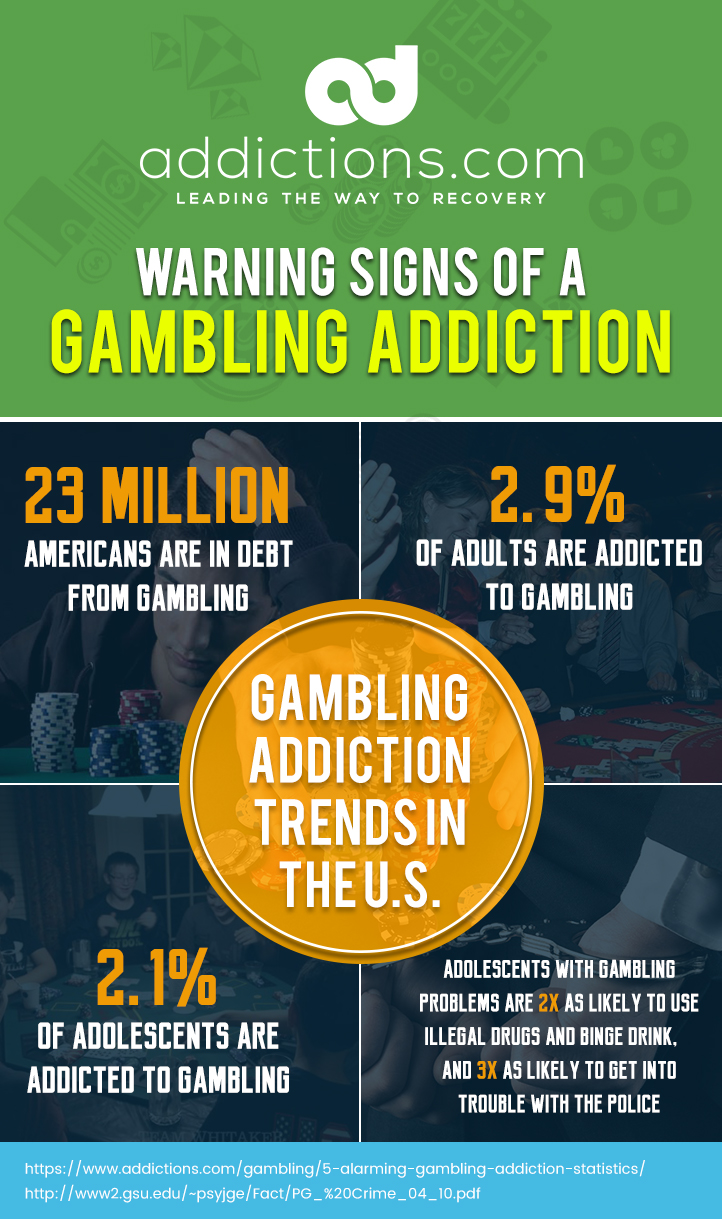Signs A Person Has A Gambling Problem
The following are questions and information that may help determine if there is a gambling problem. SIGN 1: Time away. If I know the person is gambling, the amount of time spent gambling or engaged in gambling activities increases. The gambler can be gone for long unaccounted for periods of time. You lie about your gambling habits. Lying to hide an addiction and its related behavior is a core. Signs that a person may have a problem include difficulty controlling his or her gambling, lying to family, friends and others about how much time and money are spent on gambling, and spending a great deal of time thinking about gambling and planning the next opportunity. However, there are signs that may indicate someone is experiencing a gambling problem. According to Gam-Anon, if you answer “YES” to at least six of the following questions, you may be living with a person who has a problem with compulsive gambling: Do you find yourself constantly bothered by bill collectors?

Gambling is usually a fun, socially acceptable, activity that people engage in occasionally for thrill and enjoyment. Unfortunately, for some people, it will become a problem.

Do You Have a Gambling Problem
The National Council on Problem Gambling estimates that 2 to 3 percent of the US population has a problem with gambling. The Mayo Clinic explains that gambling can stimulate the brain’s reward system in the same way drugs and alcohol do and can lead to compulsive gambling. It’s a serious condition that can destroy lives. Many people look back and wonder if there were signs they could have picked up on all along. Here are 8 common signs of gambling addiction to look out for.
#1. Spending More Money Than They Can Afford
One of the first things that happen when someone becomes a problem gambler is that they run out of money fast. A good gambler has set aside a budget of discretionary income they can afford to lose. A problem gambler will risk it all and gamble away their rent, car payment, and family savings. If you notice a loved one placing large bets they can’t afford, it’s likely they have lost control of their gambling and spending habits.
#2. Borrowing Money And Going Into Debt
Once a gambler has lost all of their money, the gambling addiction doesn’t simply go away. It stays obsessively in their thoughts and they start to seek new ways to get money to gamble with. They will start by borrowing money from family and friends. When that resource is no longer an option they might start to sell belongings, or borrow money from hard money lenders or even from darker sources. When they cannot repay this money there will be serious consequences. Problem gamblers that cannot pay their debts can lose their homes, possessions, and even their lives.

#3. No Longer Enjoys Gambling
Gambling should be fun. Casinos are designed with glitz and glamour to create a fun customer experience. Online gambling is also designed to be lighthearted fun. When the joy fades and you keep grinding away at the tables or slots like it’s your job, there might be a problem forming. Addiction is a disease where even after the joy or the “high” is gone, you keep compulsively gambling without control. A problem gambler isn’t even having fun anymore, they simply can’t fight the urge to place bets and take risks.
#4. Has Anxiety And Physical Symptoms
Gambling addiction can cause both mental and physical symptoms to manifest. In an article by Psych Guides, which is an American Addiction Center resource, mental health symptoms include anxiety, depression, and even suicidal thoughts. These mental health conditions can cause physical symptoms to arise as well; such as insomnia, pale skin, excessive weight loss or weight gain, and dark circles under the eyes. As a coping mechanism, many problem gamblers will develop a co-addiction to drugs or alcohol. If you have an addictive personality then you are more susceptible to all forms of addiction. Often while treating gambling addiction it is necessary to first treat the symptoms that are most impacting the gambler’s life such as anxiety or depression and medications can be used in addition to therapy.

#5. Risking Increasing Amounts For The Same Enjoyment
When you become addicted to anything, drugs, alcohol, shopping, gambling, etc., there comes a point where you up the ante if you get the same amount of enjoyment. Betting starts to increase even as enjoyment levels plummet. In the beginning, a casual gambler will risk small amounts and have a great time even if they didn’t win big. The experience of gambling itself was fun enough. When gambling becomes an addiction, you will feed the beast more and more to get the same small amount of enjoyment. Eventually, you won’t enjoy gambling anymore at all but won’t be able to stop.
#6. Neglects Obligations
It’s not uncommon for problem gamblers to lose their jobs because they call in sick too many times, arrive late, or are gambling on the job. Addicted gamblers might also forget to pick up their kids from school, or ignore other high priority obligations. As the addiction takes over, there is less and less space to worry about the day to day tasks that need to get done. Eventually, the need to gamble becomes all-consuming. If a normally responsible family member starts dropping the ball as they ditch obligations to spend more time gambling, this could be a red flag that an intervention is in order.
#7. Lying And Hiding Gamgling Habits
They say hindsight is 20/20, meaning that after you learn a problem exists, it’s easy to look back and spot all the signs you wish you had noticed earlier. When you don’t yet know a problem exists, it’s easy to overlook the warning signs. Compulsive gamblers become good a lying and hiding their bad gambling habits. BeforeYouBet.org has a great list of common lies gamblers tell. Among the most common are, “I can stop anytime,” and “I have my gambling under control.”
#8. Finds It Difficult Or Impossible To Stop
Finally, the compulsion takes over completely and the gambler is unable to stop, even if their life is falling apart. An addict will continue to lie, to steal, and to hurt those around them, in order to keep gambling. They will borrow more money than they can hope to pay back, and they will stop going to work or spending time with family and friends. When you are unable to control your gambling, then it’s time to admit there is a serious problem and seek help. If you notice these signs in people you care about, urge them to get treatment.
Do you notice any of these signals in a loved one, or maybe even in yourself? You can call the national hotline for problem gambling at 1-800-522-4700 for help and resources. Marina Turea Online Casino Gems also has a helpful list of gambling habits you should stop immediately.
By Sydney Smith LPC, LADC, NCGC-II
A gambling problem can be difficult to detect
Problem Gambling can be hidden for a long time which often makes it very difficult to detect. By the time the problem surfaces and the family finds out, the devastation and wreckage can be tremendous. Family members tend to know that something is wrong with their loved one but due to gambling addiction’s invisible nature, especially in the early stages of the disease, it can be extremely hard to identify.

In this article, we will discuss the signs and symptoms of, and ways to identify if your loved one has a gambling problem. Then, we’ll invite your questions about how to get help at the end.
Determining if there is a gambling problem
As a family member, we may or may not know the extent of the gambling problem or how long gambling has been an issue for our loved one. We may know about the gambling, but still have much uncertainty as to whether there is a gambling problem. So if you are asking yourself,
“How do I know if my loved one is a problem gambler?”
…the following are questions and information that may help determine if there is a gambling problem.
SIGN 1: Time away. If I know the person is gambling, the amount of time spent gambling or engaged in gambling activities increases. The gambler can be gone for long unaccounted for periods of time.
When the gambler in my life gambled, he often gambled while he was at work. So, in the early stages I did not know how much time he actually spent gambling. As his gambling worsened, he would not come home from work and would disappear for 24 hours at a time.
SIGN 2: Obsession to find money. Is the gambler becoming preoccupied or obsessed with obtaining money to gamble or thoughts of gambling? The great obsession can be on coming up with ways to borrow money, taking out loans, pawning items for cash, or planning their next bet.
Living with a gambler in the past, I would frequently have jewelry missing or items of value just disappear. Later I would learn that my gambler would pawn these items to obtain gambling money or to chase his losses. Later in the progression of the disease, the gambler may be physically present but not there, as the mind is preoccupied with gambling.
SIGN 3: Emotional volatility. Does the gambler have moods swings or gambles as a means to cope or change feelings? A gambler deep into his addiction can exhibit mood swings similar to those of a person diagnosed with bi-polar disorder. The extreme up and down in moods can be hard on both the gambler and the family members. The “up” moods can follow a win, and the gambler may even brag about the winnings. The “down” mood can be very depressive and the gambler may experience anxious or depressed mood, anger, and become irritable.
Gambling is used to change the way the person is feeling and the family members may hear the gambler make statements such as, “I had a stressful day at work and I just need to go gamble to unwind”.
SIGN 4: New secrets. Are there secretive behaviors or hiding? Is the gambler becoming very secretive in his actions and with his money? Hiding of gambling wins or losses, hiding lottery tickets, tax documents, etc. becomes common.
In my therapy practice, I often hear the spouses say, “I found payday loan papers, or while cleaning, I found ATM receipts from the casino.”. The family may begin to lose trust for the gambler as the hiding, concealing, and lying about gambling grows.
20 questions to ask yourself
These are a few of the more noticeable warning signs one may experience with the gambler. In addition, Gam-Anon created a simple list of 20 questions for family members to ask themselves.
Know Someone With A Gambling Problem
Family members of problem gamblers will answer “YES” to at least seven of the twenty questions.
- Do you find yourself constantly bothered by bill collectors?
- Is the person in question often away from home for long unexplained periods of time?
- Does this person ever lose time from work due to gambling?
- Do you feel that this person cannot be trusted with money?
- Does this person promise that he or she will stop gambling, yet gambles again and again?
- Does this person ever gamble longer than he or she intended?
- Does this person immediately return to gambling to try to recover losses or to win more?
- Does this person ever gamble to get money to solve financial difficulties?
- Does this person borrow money to gamble with or to pay gambling debts?
- Has this person’s reputation ever suffered due to gambling?
- Have you come to the point of hiding money needed for living expenses?
- Do you search this person’s clothing, go through his or her wallet, or check on his or her activities?
- Do you hide his or her money?
- Have you noticed personality changes in him or her?
- Does this person consistently lie to cover up or deny his or her gambling activities?
- Does this person use guilt induction as a method of shifting responsibility for his or her gambling onto you?
- Do you attempt to anticipate this person’s moods to try to control his or her life?
- Does this person ever suffer from remorse or depression due to gambling sometimes to the point of self-destruction?
- Have you ever threatened to break up the family because of the gambling?
- Do you feel that your life together is a nightmare?
What can you do next?
This list can be found on the Gam-Anon website or in Gam-Anon published literature. If you can identify with any of the information listed above:
- Continue to educate yourself about gambling addiction through resources and literature.
- Reach out to a trained professional.
- Attend a Gam-Anon or any 12-step support meeting for friends and family of addicts.
If we believe our loved one has a gambling addiction, it is OK to encourage them to seek help, however, it is vitally important for us as family members to seek out our own help. We are not alone, there is hope, and life can get better.